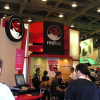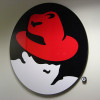Linux prepares for battle
Linux prepares for battle
By Matthew Broersma
ZDNet (UK)
July 6, 2001 3:43 PM PT
Linux and the open source software movement have faced a number of intimidating obstacles
over the past months, including the disappearance of the dot-com market enthusiasm and a
propaganda campaign by Microsoft executives branding open source as "viral" or a "cancer".
But the movement has not only survived--it is gearing up for battle.
At Linux Expo in London this week companies are showing off the latest additions to the open
source arsenal, including tools designed to step up software development and software to make
Linux more attractive for high-end servers and workstations. In the mean time, Linux has grown in
the last year into a serious competitor for Microsoft's Windows operating system, according to
industry experts. As an IBM executive put it, Linux is no longer just for "bearded, sandal-wearing
geeks".
Borland, the troubled
software company
specializing in developers'
tools, is demonstrating its
Kylix development
environment at the show.
Kylix, introduced earlier this
year, is designed to make it
easy to program
applications for both
Windows and Linux, and is
the first easy-to-use RAD
(rapid application
development) environment
for Linux.
It uses Borland's Delphi
programming language,
which competes with
Microsoft's Visual Basic on
Windows. Microsoft does
not make a version of
Visual Basic for Linux. Using Kylix it is possible to create software in Delphi, then simply recompile
it in Kylix to run on Linux.
"This is generating a lot of excitement," said Borland's RAD product line manager Jason Vines.
IBM will be showing off its new software to improve Linux performance for high-end computers in
large businesses.
Last week IBM launched version 1.0 of JFS, a project to improve the Linux file system. A file system
controls the way documents are stored on a computer. IBM also released new software to improve
Linux performance on multi-CPU PCs, important for the high-powered servers used by enterprises.
IBM has quickly transformed itself into Linux' most vocal advocate in the corporate world. The
company has pledged to spend $1bn (about £7bn) this year on Linux development, and is
introducing the open source operating system into many of its products.
"Linux is increasingly being used in productive, commercial environments," said Deepak Advani, an
IBM vice president in charge of Linux business development. "This is not about a bunch of bearded,
sandal-wearing geeks who are the only ones who know how to use it. This applies as much to the
blue suits as to those of us who prefer not to wear socks."
At the same time, Linux is increasingly making its way into non-PC devices such as set-top boxes
and handheld organizers. It competes in this so-called "embedded" market with Microsoft, among
others, and its Windows Embedded and Windows CE operating systems, but Linux gives
developers more freedom and is available more cheaply than proprietary operating systems. IBM,
for example, is demonstrating a Linux-based watch at the conference.
These new developments arrive as some see Linux maturing from its early, in-your-face days to
focusing on steady, sustained growth.
Linux has made rapid progress in the server market, where it continues to grow despite the
dot-com crash. A recent study estimated that Linux now runs 30 percent of Web servers, and
companies buying Linux say that it has now conquered many of its early shortcomings, such as
lack of applications and its restriction to lower-end machines.
This success has helped some Linux companies to prosper--Red Hat, which sells a distribution of
Linux and which went public at the height of the dot-com frenzy, recently announced its first
profitable quarter, even as competitors such as Turbolinux and VA Linux have run into difficulties. VA
Linux, one of the earliest Linux companies, has said it will stop selling Linux-based hardware to
focus on software and services.
Microsoft, never a friend of open source, has gone on the attack in the past few months, with
executives including Bill Gates branding open source as an enemy of intellectual property and free
enterprise. But there are some signs that the strategy has backfired: it has given fractious Linux
leaders a cause to unite against, and has attracted criticism from legal experts, some of whom
have called Microsoft's statements on open source and the GNU Public License misleading.






































































